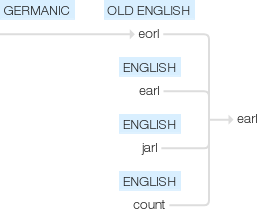Earl
Old English eorl, of Germanic origin. The word earl originally denoted a man of noble rank, as opposed to a churl, also specifically a hereditary nobleman next above the rank of thane. It was later an equivalent of jarl and, under Canute and his successors, applied to the governor of divisions of England such as Wessex. In the late Old English period, as the Saxon court came under Norman influence, the word was applied to any nobleman bearing the continental title of count (see count2).
wiktionary
From Middle English erle, erl, from Old English eorl, from Proto-Germanic *erlaz (compare Old Norse jarl, Old High German and Old Saxon erl), from Proto-Germanic *erōną, *arōną (compare Old Norse jara(“fight, battle”)), from Proto-Indo-European *h₃er- (compare Latin orior(“to rise, get up”), Ancient Greek ὄρνυμι(órnumi, “to urge, incite”), Avestan 𐬆𐬭𐬆𐬥𐬀𐬊𐬌𐬙𐬌 (ərənaoiti, “to move”), Sanskrit ऋणोति(ṛṇóti, “to arise, reach, move, attack”)). Also displaced unrelated but similar ealdorman(“alderman”).
etymonline
earl (n.)
Old English eorl "brave man, warrior, leader, chief" (contrasted with ceorl "churl"), from Proto-Germanic *erlaz, which is of uncertain origin. In Anglo-Saxon poetry, "a warrior, a brave man;" in later Old English, "nobleman," especially a Danish under-king (equivalent of cognate Old Norse jarl), then one of the viceroys under the Danish dynasty in England. After 1066 adopted as the equivalent of Latin comes (see count (n.1)).
Earl Gray tea (1880s) was originally a Chinese tea blended with bergamot oil, supposedly from a recipe given to Charles, second Earl Gray (the Whig prime minister), in the 1830s, but perhaps it was named later, commercially, in his honor.
